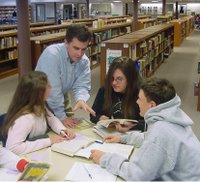A funny thing happened on the way to the 21st century classroom
As I plod along into the 21st century, there are two little creatures on either side of me. On one side, one creature - I'll call him "Thing 20" - keeps tugging at my sleeve, while "Thing 21" rolls his eyes and shakes his head. Just hurry up, he seems to be saying in an exasperated tone. 20, it seems, spends all his time asking questions about where we're going. Why, why, why? he constantly asks. Both 20 and 21 annoy me in their own way.
Anyway, right now, the students in my Writing the Essay class are the only ones who have set up blogs to supplement their in class learning. It's not like my other students are left scrawling on the backs of shovels with chalk. My sophomores put together multi-media presentations and used a wiki to compile their research and my public speaking class recorded podcasts. Not too shabby.
It's just that, with my Writing the Essay students beginning to use their blogs more (of course as the semester winds down, rather than gears up), I am again struck by all the small bits of teaching and learning that cannot be neglected as I meander my way to the 21st century classroom. Along the same vein, I have been struck once again by the inseparable nature of reading and writing. The class lagged at times this year, and I'm convinced it's because I didn't do enough to stimulate their thinking with reading. It happens so naturally in a typical English class, I must have assumed it would here too.
It began when I assigned them to select a topic and then use their blogs to keep track of their research, posting hyperlinks to their sources and reflecting on their findings. Of course I assumed too much and I think I lost sight of what has become a roadmap for my trek towards the 21st century school house. It dates back to a post by Will Richardson a year ago, where he talks about the idea of blogging as a means to achieve a synthesis of ideas. That's what I wanted - and still want - my kids to do. All the time. Richardson says, "if you’re reading and writing regularly about something that you are truly passionate about, that synthesis becomes almost second nature. You are always making connections and writing your own narrative." In a recent Clay Burrell post, he hits on another component of writing and, by extension blogging, when he puts out the call for collaboration with his upcoming writing class. As usual, Clay reminds me of the great potential for these digital learning tools and a comment on his post reminded me of Richardson's words. Sean writes, "Students must write for keeps. In addition, for the writing course, form must follow function… Because writing is an iterative, intrinsically valuable practice, I believe a writing class does best when it rewards reflection on the process, a dialectical engagement with all texts." Again the reading and writing link is vital. That's where the blog must come in.
So back to my Writing the Essay students. I asked them to start doing it. Simple as that. But not really.
And slowly, they have kind have begun to, a little. Well, not exactly. But what do I expect? How much time did I spend to analyze and evaluate the genre of blogging? It's like I asked them to write a short story without reading a bunch of examples and even studying Poe's theory of composition. But, in the last week or so, as they have begun reading more, their blogging has improved. I'd still like them to more fully explore the potential of hyperlinking their ideas to broaden their connections, and to develop more creative titles for their blogs, and to write with a more purposeful self-reflection, and to ... you get the point. I'm still trying and we'll see how it works out with less than two weeks left in the semester.
And to get back to Richardson's ideas about synthesis, it's apparent that time is needed to steer students to quality blog selections, both so they can see the style in action, but also as a way to stimulate their own thinking. Synthesis like this must evolve, more than it happens. And therein lies the rub. Today's education is about product (results) than it is about process. And like the students in my Writing the Essay class, I'm just getting started.
I feel a little better. I can tell "Thing 20" to back off a little bit and let "Thing 21" know that I'm getting there. Be patient.






2 comments:
Nice post, Bing. Seems we're having the same struggle and seeing the same reasons to keep trying and refining.
It is nice, though, to see that students enjoy this type of writing, and gradually come to increase its frequency, to practice it more.
Ah, I'm trying to leave this comment at a bad time. I'll have to give it another shot later.
I really just meant to say that I related to much of what you wrote.
I love this blog! Keep up the good work.
Check this out:
http://theinfluentialteacher.com
Post a Comment